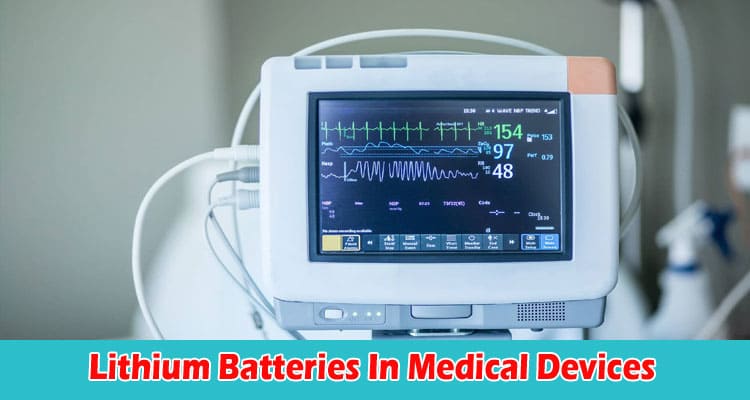The field of healthcare has experienced remarkable advancements in recent years, largely driven by technological innovations. One such innovation that has revolutionized healthcare is the use of lithium batteries in medical devices. Lithium batteries, known for their high energy density and long-lasting power, have paved the way for the development of cutting-edge medical devices that enhance patient care and improve diagnostics. This article explores the advancements in lithium battery technology and their impact on healthcare, while also addressing safety considerations and future implications.
Overview of Lithium Batteries in Medical Devices
The history of lithium batteries traces back to the 1970s when they were first introduced. Over the years, significant improvements have been made in their design and performance. Today, lithium batteries are extensively utilized in medical devices due to their superior energy storage capabilities. These batteries are commonly used in implantable medical devices such as pacemakers, cochlear implants, and neurostimulators, as well as wearable devices like fitness trackers and smartwatches.
Advancements in Lithium Battery Technology
- Longer Battery Life and Increased Energy Density: Lithium batteries have made substantial progress in terms of battery life and energy density. The ability to store more energy in a smaller space allows medical devices to operate for extended periods without the need for frequent battery replacement or recharging. This advancement significantly improves patient convenience and reduces the risk of device malfunction due to power depletion. Take advantage of our exclusive offer and Save 30% Code: GOLDENMATE.
- Smaller and Lighter Batteries for Enhanced Portability: Miniaturization is a key aspect of medical device development. Lithium batteries have undergone significant downsizing, enabling the creation of smaller and lighter medical devices. This portability enhances patient comfort and mobility, making it easier to integrate medical devices into daily life. For example, wearable health trackers powered by lithium batteries can continuously monitor vital signs without causing any hindrance to the wearer’s activities.
- Quick Charging and Efficient Energy Management Systems With the introduction of fast-charging technologies, lithium batteries can be charged rapidly, reducing the downtime of medical devices. Moreover, efficient energy management systems ensure optimal power usage, maximizing the battery life of medical devices. These advancements result in improved patient care by minimizing interruptions in device functionality.
Impact on Healthcare
- Enhanced Patient Care and Comfort: Implantable medical devices, such as pacemakers and neurostimulators, rely on lithium batteries to deliver essential therapies. The long-lasting power provided by lithium batteries ensures uninterrupted device functionality, eliminating the need for frequent surgeries to replace batteries. Additionally, wearable devices like insulin pumps and continuous glucose monitors powered by lithium batteries offer more convenient and comfortable alternatives to traditional methods of disease management.
- Improved Diagnostics and Monitoring: Continuous glucose monitors, enabled by lithium batteries, provide real-time glucose readings to individuals with diabetes, offering a more accurate and convenient way to manage their condition. Similarly, remote patient monitoring systems powered by lithium batteries allow healthcare professionals to remotely monitor patients’ vital signs, reducing the need for frequent hospital visits and improving overall patient outcomes.
- Advancements in Surgical Procedures: Lithium batteries have played a pivotal role in the advancement of surgical procedures. Robotic surgery systems, powered by lithium batteries, offer increased precision and control during complex surgeries, resulting in improved patient outcomes. Furthermore, the use of lithium-powered minimally invasive surgical tools allows for smaller incisions, reduced scarring, and faster recovery times.
Safety and Regulatory Considerations
Safety is of paramount importance when it comes to medical devices. Lithium batteries undergo rigorous testing and adhere to strict regulatory standards to ensure patient safety. Regulatory bodies, such as the U.S. Food and Drug Administration (FDA), closely monitor the use of lithium batteries in medical devices to ensure compliance with safety guidelines. Manufacturers and healthcare providers also play a vital role in mitigating risks associated with lithium batteries by implementing robust quality control measures and providing appropriate training to healthcare professionals.
Future Implications and Challenges
- Potential Future Advancements in Lithium Battery Technology: Ongoing research and development in lithium battery technology hold promising prospects for the future. Advancements such as solid-state batteries, which offer improved safety and higher energy densities, have the potential to revolutionize medical device capabilities further. Additionally, the integration of lithium batteries with emerging technologies like artificial intelligence and the Internet of Things (IoT) may lead to innovative healthcare solutions.
- Addressing Concerns Regarding Environmental Impact and Recycling: While lithium batteries have numerous benefits, concerns regarding their environmental impact and recycling remain. As the usage of lithium batteries increases, proper disposal and recycling methods must be developed to minimize the environmental footprint. Collaboration between battery manufacturers, healthcare providers, and regulatory bodies is crucial to establish sustainable practices for the lifecycle management of lithium batteries in medical devices.
Conclusion
Lithium batteries have become indispensable in healthcare, powering a wide range of medical devices that improve patient care and diagnostic capabilities. Advancements in lithium battery technology, such as longer battery life, smaller size, and quick charging, have enhanced patient comfort and mobility while enabling the development of advanced surgical procedures. Safety considerations and regulatory standards ensure that lithium batteries in medical devices maintain high standards of patient safety. Looking ahead, the continued progress in lithium battery technology and its integration with emerging technologies present exciting opportunities for the future of healthcare, furthering the positive impact of these batteries on patient care and medical advancements.







